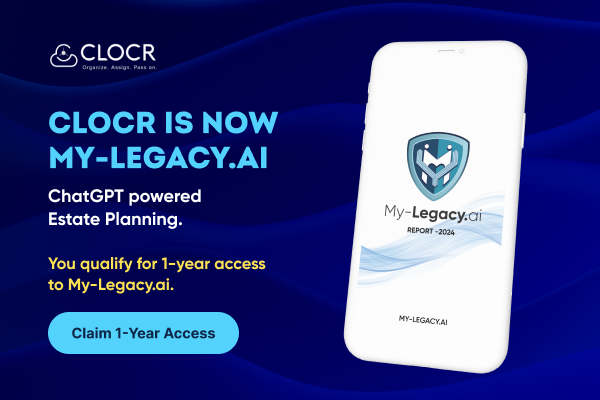You have worked hard for years, saving and planning for retirement. You might already have an Estate Plan in place for all your tangible assets.
Have you invested in cryptocurrencies lately? Do you use online banking services or third-party payment services? Do you have an online business on E-commerce sites such as eBay, Amazon or Etsy?
If you have answered YES for any of the above questions, have you made arrangements for what must happen to these accounts after you’re gone? Even if you haven’t done any investments mentioned above but are active on social media and use Cloud to store your important documents, have you made arrangements so that your family members can handle these accounts after you’re gone?
In the Digital Age, making arrangements for your Digital Property is as important as making arrangements for your physical assets. Almost everyone spends a part of their daily routine online. This might range from checking weather reports and news online to using social media and emails.
Estate Planning basically deals with making provisions to safeguard your physical assets. Though your social media profiles might not hold any monetary value, they certainly hold sentimental value to you and your family members.
The photos you posted online or the notes you made in a document on your computer or the documents you stored on Cloud – you would want your family members to safeguard them when you are no longer around, don’t you?
One of the problems with Digital Assets is, unlike paper documents, these leave no trail. This means your family members cannot ‘sift’ through your computer or online accounts and handle them on your behalf. Even if you make arrangements such that they can login using your password, most of the social media companies have terms of service that might term these accesses as ‘illegal’ or ‘hacking.’
The Online World is endless. If your family members have no clue as to what kind of online accounts you own, there’s simply no way to safeguard your online presence.
If you are thinking what part of your ‘Online Life’ or ‘Digital Life’ comes under Digital Assets, here’s a list that might help:
- Electronic devices such as personal computers, laptops, smartphones and tablets
- Social Media Profiles
- Email accounts
- Online banking and third-party payment services
- Online shopping accounts and magazine subscriptions
- Investment accounts and cryptocurrency
- Online Bill payment apps
- Websites and blogs
- Cloud storage services or other sites where you share/store photos, videos and documents
What do you do with all these accounts? How do you let your family members handle them for you after you’re gone? We have already discussed that sharing passwords might not work well for your family members ‘legally.’
Some Social Media Companies such as Facebook and Instagram allow their users to create a Legacy Contact. All you have to do is set a Legacy Contact for these accounts. In case of your demise, your Legacy Contact can request your social media profile to be deleted, closed or memorialized.
You might want to read:
How to Memorialize a Facebook Account?
What is Google Inactive Account Manager?
You can also create an Estate Plan exclusively for your Digital Assets – also known as a Digital Estate Plan.
The steps involved in creating a Digital Estate Plan:
Make an inventory:
List all the online accounts along with usernames and other login details. Online accounts include emails, social media, cloud storage, gaming profiles, online shopping, personal blogs and other accounts.
Remember to list the electronic devices you have used to access these accounts.
Leave instructions:
What do you want your family members to do with your online accounts after you’re gone?
Do you want them to download all the files from Cloud and close the account? Cancel subscriptions to online magazines and entertainment sites? Memorialize your Facebook and Instagram accounts? You need to let them know all these details.
Remember, if you want your family members to take control of your online accounts, you will have to find a way to pass on the important login details such as passwords and security Q&As. You can do so by using a Password Manager.
A Password Manager requires one Master Password to access all your online account details (usernames and passwords).
Thinking of which Password Manager to use? You might want to have a look at 5 Best Password Managers to try.
Appoint a Digital Executor:
Similar to how an Executor handles your Estate, you can appoint a ‘Digital Executor’ to handle your ‘Digital Estates.’ Make sure to choose someone who is tech-savvy and knows their way through handling online accounts.
Finalize your Digital Estate Plan:
Talk to your trusted attorney and get them to authorize your Digital Estate Plan in writing. By doing so, you are making sure your final wishes on what must happen to your Digital Assets are followed.
One important point to consider while planning for your Digital Assets:
If you live in the US, you might know that there are certain laws that govern the access to your Digital Assets.
In the US, the law governing Fiduciary Access to Digital Assets is known as RUFADAA.
You might also be interested in reading:
Digital Estate Planning for Senior Citizens
Why is Digital Estate Planning important?
Clocr provides Digital Estate Solutions for all. Sign-up with Clocr today, get all the help you need in creating a Digital Estate Plan and safeguard your Digital Assets forever.




